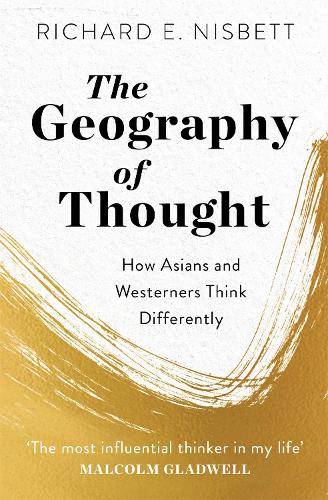
The Geography of Thought: How Asians and Westerners Think Differently
(Paperback)
Publishing Details
The Geography of Thought: How Asians and Westerners Think Differently
By (Author) Richard E. Nisbett
John Murray Press
John Murray Business
9th July 2019
11th July 2019
United Kingdom
Classifications
General
Non Fiction
153.4
Physical Properties
Paperback
288
Width 128mm, Height 196mm, Spine 24mm
206g
Description
'The most influential thinker, in my life, has been the psychologist Richard Nisbett. He basically gave me my view of the world.'
-Malcolm Gladwell"One of the world's leading thinkers" Daily TelegraphWhen Richard Nisbett showed an animated underwater scene to his American students, they zeroed in on a big fish swimming among smaller fish. Japanese subjects, on the other hand, made observations about the background environment...and the different "seeings" are a clue to profound underlying cognitive differences between Westerners and East Asians. As Professor Nisbett shows in THE GEOGRAPHY OF THOUGHT people actually think - and even see - the world differently, because of differing ecologies, social structures, philosophies, and educational systems that date back to ancient Greece and China, and that have survived into the modern world. As a result, East Asian thought is "holistic" - drawn to the perceptual field as a whole, and to relations among objects and events within that field. By comparison to Western modes of reasoning, East Asian thought relies far less on categories, or on formal logic; it is fundamentally dialectic, seeking a "middle way" between opposing thoughts. By contrast, Westerners focus on salient objects or people, use attributes to assign them to categories, and apply rules of formal logic to understand their behaviour.Reviews
A psychology professor dares to compare how Asians and Americans think. The upshot of Nisbett's research is that differences are real. They might not always be for the better, but they matter. - Forbes
The most influential thinker, in my life, has been the psychologist Richard Nisbett. He basically gave me my view of the world.The man whose ideas led to Malcolm Gladwell's Blink and to Nudge - The Times[A] landmark book. The Geography of Thought shows that understanding of how individuals in eastern cultures think is not just nice, but necessary, if we wish to solve the problems we confront in the world today. We ignore the lessons of this book at our peril.Nisbett's results indicate fundamental differences in the ways Westerners and East Asians view the word.Ground-breaking workAuthor Bio
Richard E. Nisbett, Ph.D., has taught psychology at Yale University and the University of Michigan, where he is the Theodore M. Newcomb Distinguished University Professor. He received the Distinguished Scientific Contribution Award of the American Psychological Association, the William James Fellow Award, and a Guggenheim Fellowship and in 2002 became the first social psychologist elected to the National Academy of Sciences in a generation. The co-author of Culture of Honor and numerous other books and articles, he lives in Ann Arbor, Michigan.
